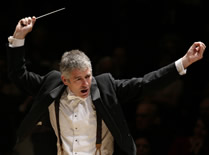The Bel Canto Company, under the direction of Artistic Director and Conductor Welborn E. Young, continued this season’s theme of employing additional choral forces in its final concert of the 2009-10 “Bel Canto & Friends” series. The University of North Carolina Greensboro Chamber Singers, which Young leads in academe, joined with the BCC for three hearty works that demand the 60 voices that the two combined ensembles provided. The very large audience in attendance at Christ United Methodist Church was treated to a full evening of diverse styles.
The evening began with the joined choirs’ enthusiastic unaccompanied singing of the first two of three hymns that make up Brahms’ Fest- und Gedenksprüche, Op. 109 (Festive and Thoughtful Messages). This work, written for double chorus, provided a perfect vehicle to display the power and color of the large ensemble. The first hymn, “Unsere Väter hoffen auf dich” (“Our fathers trusted in you”), features rapid exchange of text between the two choirs. The second — “Wenn ein starker Gewappneter” (“When a heavily armed man [guards his palace]”) — contains some text that must have aided in Young’s decision to call the concert “Divided We Stand”: “But every kingdom, if it becomes divided against itself….”
The combination of choirs brings promise as well as problems, especially if the two do not often work together. The large sound was definitely fitting for the character of the Brahms, but some of the entrances sounded more like clusters rather than clear chords, especially in the second verse of the latter hymn.
The joined forces were essential to pull off Thomas Tallis’ Spem in Alium Nunquam Habui (I have never put my hope in any other but in you), a Renaissance motet written in 1570 for eight choirs. Young explained to the audience as the choirs situated themselves around the sanctuary how each choir would be joined by another, and then “go away…,” and then “come back … and if all goes well, we’ll all join together in measure 40.” It was this piece especially that gave rise to the title of the concert.
This is a remarkable work, and it was a delight to hear the ebb and flow of the sounds of the various choirs coming in, fading out, and joining all together. And, of course, it is also treacherous to try to keep all forces together and on pitch. But Young did a fine job of keeping the sections clear and mostly in tune.
BCC member and UNCG doctoral student Robert Matthews led the BCC women in David MacIntyre’s “Ave Maria,” a repetitive, chant-like composition written in 1995. The minimalist-influenced work builds to considerable intensity, which the women communicated.
The men of the BCC, also led by Matthews sang Ola Gjeilo’s “Ubi Caritas,” a work that exploited a wonderful unison sound from the ensemble. In both this work and in the “Ave Maria,” Matthews displayed both vigor and flowing aspects of the art of conducting, respectively.
The first half also included a performance of Mozart’s Regina Coeli with Liz Doebler, Stephanie Bartis, Bill Snedden, and James McClure as soloists. Although a religious work, it sounds more like an opera, with the four soloists taking turns as the main characters. It also includes a “Hallelujah” quote from Handel’s Messiah. BCC accompanist Karen Beres ably played the orchestral arrangement, but not with as much vigor as one might have liked; perhaps this helps explain the flat and lackluster choral sound.
The second half of the concert began with three songs by Mack Wilberg (b.1955). “O Whistle and I’ll come to ye” was lots of fun with a rollicking 6/8 meter that helped with the dance feel. “My Love’s in Germany” is more sober, and the women’s unison gentle lament was beautifully performed, with the men providing accompanying “oohs.” “I’ll ay call in by yon town” brought back the energy and optimism of the first piece. Throughout, Beres’ accompaniment added vigor and spark to the proceedings.
The UNCG Chamber Singers gave a gorgeous performance of Eric Whitacre’s “Sleep,” an a cappella work with wonderfully tight harmonies. The first verse features the entire ensemble singing in the same rhythm, which displayed terrific ensemble. The tuning was exquisite. One could have asked for a few more consonants at the ends of phrases; perhaps Young was fearful of disturbing the gentle mood.
Violinist Fabian Lopez joined with pianist Beres for a BCC performance of Ralph Vaughan Williams’ Serenade to Music, originally written for 16 soloists and orchestra. The violin provided a wonderful timbre to this testament to the power of music. Alternating solos (Nicolle Sherwood, Hilary Webb, Karen Lecky-Springer, Robert Matthews, and Tandy Brown) with choral singing supplied a mixed palate of sound, which is one of the piece’s trademarks.
The evening of fine choral music concluded with the BCC and the Chamber Singers performing Jonathan Dove’s “Ring Out, Wild Bells,” a setting of a poem by Tennyson.











